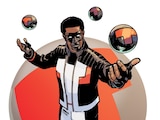With his classic movies about the living dead, director George Romero laid the groundwork for what would quickly come to be seen as the zombie genre—a subgenre of horror known for its suspense, gore and apocalyptic overtones. We’ve since seen variations on it in everything from the work of Lucio Fulci to the viral nightmare of 28 Days Later to the all-ages popularity of Plants vs. Zombies. We know what to expect when it comes to zombie stories. We know the genre.
Perhaps that’s why zombies seem to have gotten tired of their genre and have started showing up in others.
iZombie, the new CW series based on the Vertigo Comics series, feels unique and fresh partly due to the way it mashes up a few different storytelling genres. It’s equal part comedy, romance and procedural, and even includes a nod to the super hero genre in the way that Liv uses her abilities to help solve crimes. And it just also happens that some of the characters are zombies.
Why do it this way? It may be because at this point we’ve seen too many traditional zombie stories that they no longer excite us. Or perhaps we’re looking for a way to add some unpredictability to other popular genres. Whatever the reason, it’s clear that storytelling is even better when it has some teeth.
Here are four genres that can be made even better by the undead…with a few recent examples!
War Stories
The greatest sacrifice in wartime is to give your very life for your country. At least, it used to be. In Star Spangled War Stories Featuring G.I. Zombie, we’re introduced to Jared Kabe, a soldier who died and was revived as a zombie only to continue to serve his country as a covert agent. War stories look at the human state under the greatest of pressure. When everything you are can be wiped away in an instant by an enemy’s bullet, bomb or missile. It’s a nightmarish existence, where men and women are asked to do things at odds with everything they’ve been taught since birth, and the only thing there is to grasp on to in order to maintain something of your humanity is that everyone involved is facing the same stakes—kill or be killed. You’re doing what you’re doing because it’s the only way to preserve your very life and make it home to see your loved ones.
But what if that’s no longer the case? What if death isn’t a permanent state? Or in the case of G.I. Zombie, what if you’re already dead? Then what reason do you have for committing the atrocities of war and espionage? You already look like a monster, does an inability to die turn your actions into those of a monster as well? Or are there causes even greater than self-preservation that make those actions acceptable?
These are some of the themes that run throughout G.I. Zombie, an underrated gem written by Jimmy Palmiotti and Justin Gray and drawn by Scott Hampton. Sadly, G.I. Zombie is ending this month, but the eight issues will soon be released as a trade, which would be well worth picking up if you haven’t been reading it.
Super Hero Stories
If our list of our 13 Top Undead Characters didn’t make it clear, the super hero genre is ripe with zombies, and for good reason. They make great villains. But it’s when our heroes become zombies that things get really interesting, as we witnessed in Geoff Johns’ classic Blackest Night.
In this Green Lantern epic, Black Hand raises an army of undead Black Lanterns made up of fallen Lanterns and super heroes, pitting heroes against fallen heroes. Admittedly, we’ve seen characters struggle with killing zombies who were their friends and family members many times before, but why it works so well in super hero comics is that we as readers have a similar relationship to the undead heroes as the protagonists. We know them well and they feel like old friends. It gives us a real stake in the moral dilemma that’s at the heart of every zombie book: Can you kill the people you care about just because they’ve changed?
Period Dramas
You’ve seen (or at least heard of) the literary mashups, like Pride and Prejudice and Zombies. But what’s interesting is how well-suited Post-Victorian England seems to be for a zombie tale. Perhaps it’s the idea of British propriety running up against a force that’s anything but proper. Whatever the reason, it works, and you can find an excellent example of it in Vertigo’s The New Deadwardians.
In The New Deadwardians, the zombie virus is running rampant across England in the 1800s, but fortunately, there’s a cure—vampirism. If you’re bitten, you can maintain your intelligence and humanity by becoming a vampire, if you can afford it. Set against this backdrop of supernatural class warfare, where most of the British upper class have become vampires, while the lower class continues to struggle with mortality and the real danger the zombie virus presents, our main character, Chief Inspector George Suttle, works a job which is inching its way toward irrelevance. He’s a homicide detective. With much of England now undead, murder has become almost obsolete. That is, until he discovers a body of a young vampire who seems to have been murdered despite lacking any obvious signs.
To reveal more would be unthinkable. Suffice it to say that this series by Dan Abnett and I.N.J. Culbard is one of the best zombie stories—and period dramas—you’ve never read.
Vampire Stories
Why have one undead creature when you could have two? More and more that seems to be the prevailing thought. Heck, even the iZombie comic book included vampires, ghosts and all sorts of other reanimated critters. But zombies and vampires, in particular, seem to mix well together. You see this in the aforementioned The New Deadwardians and you see it in I, Vampire, the bloodsucker-as-hero horror comic written by Josh Fialkov and drawn by Green Arrow’s Andrea Sorrentino that launched with The New 52.
I, Vampire is a fun, under-the-radar gem and it’s worth rediscovering. The series managed to pack quite a bit into its twenty-issue, three-volume run, but some of its most thrilling, can’t-believe-that-just-happened storytelling takes place in the second volume, when vampire hero Andrew Bennett and his allies come into conflict with a vampire-hunting cult. Already a formidable enemy, the Van Helsing hunters launch an all-out assault on our heroes, who manage to gain the upper hand only to have the rug pulled out from under them, as the enemies they thought they’d put down—and vampires who’d fallen in the battle—both start rising up as zombies.
Unlike with some of our previous genres, we’re not going to argue that adding zombies to vampire tales adds new depth or meaning. It’s just a lot of fun.
So what other genres do you think could benefit by adding some undead? Cop stories? Tearjerkers? Musicals? Are there any other genres we’ve seen lately that have benefitted from zombies? Leave your comments below, and definitely check out iZombie tomorrow, March 17th at 9 p.m. (8 p.m. CST) when it premieres on The CW for more genre-bending mayhem.
























